

Registered Charity No 1075342

Reviews of Meeting Points Presentations
September 2012 - November 2012
Reviews by Jacqueline Sims
Meeting photos: Anthony Smith
At Glasgow School of Art in the 1960s Donald Melvin painted, drew, looked at architecture – both inside and out, made furniture, stained glass, jewellery and many other things.
Donald started his talk with an overview, then took a closer look at parts of Poole, Swanage, Corfe Castle and Dorchester, showing us unusual views of well-known local buildings. Particularly in the case of Poole, with its history as a thriving port spanning several centuries, it is imperative to look beyond the present-day facades to spot the
Our first meeting of the new academic year was planned to follow through from Dorset
Architectural Heritage Week when Donald Melvin, artist and lecturer, introduced us
to local buildings of architectural merit.
Donald Melvin
Dorset Buildings:
Ancient & Modern
September 2012 Meeting

hidden elegance of earlier times. The town boasts French, Italian, Georgian and Victorian influences, dating from the 17th century, with a variety of fascinating carvings, cornices, and intricate brickwork detail. All this can be missed if one fails to look upwards, past the shabby disguise of today's lower-end commerce.
Swanage too hides many of its best architectural features under the guise of a beachside holiday town, although the discerning eye spies rich detail in porches, doorways and windows that speak of a different - often Edwardian - past. And the solidity of Purbeck stone gives substance to many fine buildings, including the impressive Town Hall (left) built by George Burt.
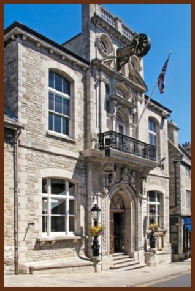
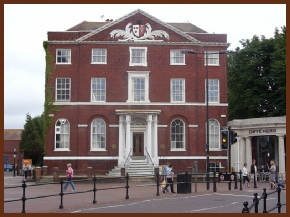

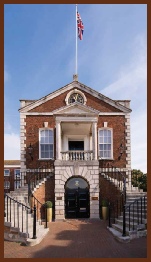
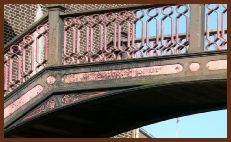
Poole Level Crossing Bridge
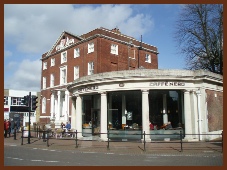
Age and history are evident in most Dorset towns, as the churches of Wareham and
Moreton testify. Are certain Dorchester buildings pretentious, Donald wondered? Is
there a pagan past to be seen in house names around Corfe Castle?
Whatever one's views, Donald demonstrated that there is much more, architecturally
speaking, to the area than meets the eye, and that the devil is, as always, in the
detail!

Psychology
What does it tell us about motive in politics and everyday life?
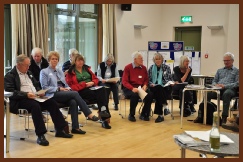
With a broad background encompassing teaching, public speaking, and politics, behavioural therapist Ros Keyes is well placed to address an issue we don’t contemplate every day – namely the possibility of applying the tools used in individual psychological healing to complex institutional and political processes.
Contrasting the philosophical worldviews of Hobbs and Rousseau, and extending these to more recent thinkers such as Marx and Freud, Ros underlined how the belief systems we are born into, or otherwise acquire, colour and influence our perceptions and preconceptions. Thus we are “hard wired” into a certain worldview, which generates positive and negative prejudice and drives our understanding of right and wrong. This tendency is particularly evident in the political system.
In the course of a wide-ranging discussion covering class, status, and privilege, Ros pointed out that politicians might achieve better results by learning and applying some of the precepts of Cognitive Behaviour Therapy (CBT). As an evidence-based system, it may have the potential to alter deeply-held, though often distorted, thought patterns conditioned by core beliefs, replacing them by a more accurate understanding of how our thinking styles and feelings of self-
worth are constructed. This deeper understanding could bring significant political benefits, reducing conflict and enhancing constructive collaboration.
Ros Kayes
October 2012 Meeting
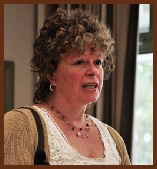

Nick R Thomas
The Power of Humour in Everyday Life
November 2012 Meeting

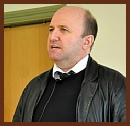
Nick Thomas, a professional public speaker, comedy script writer, performer and teacher spoke on "The Power of Humour in Everyday Life." Nick, who is based in Bournemouth and works nationwide, has a vast repertoire of talks, jokes, and
mots justes for every occasion, from small local groups to significant corporate occasions.
In the course of taking what he refers to as an unpretentious look at humour, Nick described how he came to his career from an early age by taking part in local amateur competitions, then working on to writing for radio comedy shows including for the BBC.
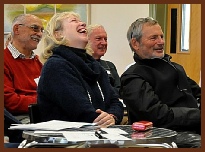
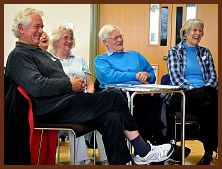
Some of the packed audience enjoying Nick’s entertaining & amusing presentation
He outlined how a large proportion of his raw material is drawn from newspapers and journals, which provide the basis for topical jokes based on real situations. Humour, he emphasized, can be of benefit in almost any situation,
including breaking the ice, dispelling tension, and creating rapport. Used appropriately, it creates instant impact and makes the user memorable. Technique is important: jokes can be constructed forwards or backwards depending on the effect sought; associative jokes are geared to people's own topical humour and situations; play on words can be effective but care is
needed lest it be taken farther than intended! And "found humour" refers to unintentionally hilarious items found in the press or advertisements.
Nick stressed that to be a successful humorous speaker, perseverance is an essential quality - the right reactions don't always come instantaneously! The examples he gave to

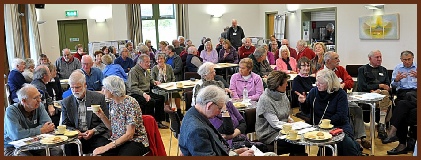
illustrate his approach had us all laughing throughout, but perhaps his final crack was the most telling for a U3A audience: "You don't stop laughing because you die, you die because you stop laughing!"
So take heed and keep the jokes coming!













